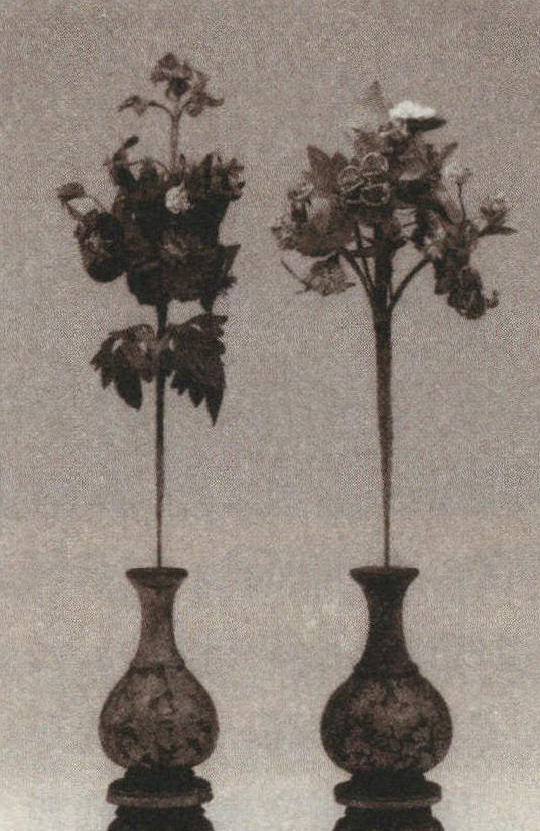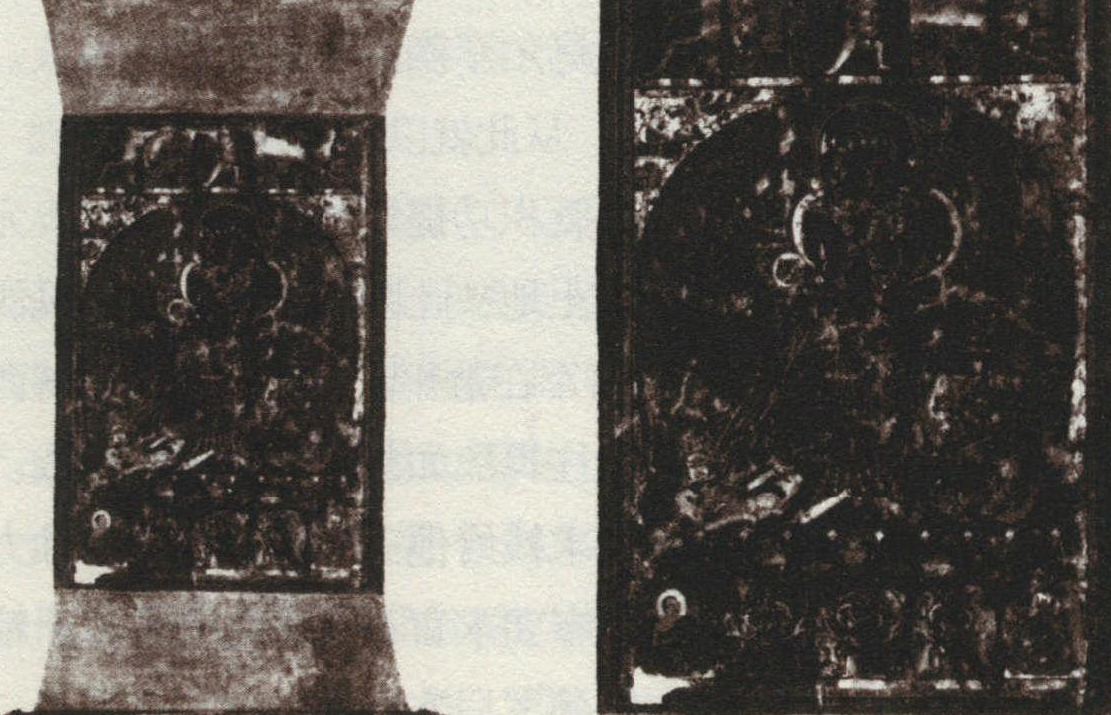何进滔(?~840),唐朝少数民族将领、藩镇。字端公。先辈原来是西域何国 (亦名屈霜尔迦,居今撒马尔罕西北)人,后来内迁定居于灵武,后辈们都以灵武为籍贯。曾祖父何孝物、祖父何俊、父亲何默,都是朔方军军人。进滔青年时曾在魏博节度使田弘正军中效力。元和十年 (815),田弘正奉召讨伐叛军王承宗,何进滔率领一千多骑兵奔袭王承宗的镇州 (今河北正定),大获全胜,迫使王承宗率部归顺朝廷。何因功晋升衙内都知兵马使。元和十三年 (818),田弘正再次奉命讨伐平卢淄青节度使李师道叛军,何进滔再率铁骑攻占浑州 (今山东东平),又升授兼侍御史。在史宪诚代替田弘正、田布父子的军权以后,何进滔成为史宪诚的部将。大和三年 (829),史宪诚被本军哗变官兵杀死,全镇一时群龙无首,乱兵骚动,势如干柴烈火,大有一触即发之危。在这千钧一发之际,部分官兵提议,请何进滔出山主持军务。将士们认为: “得何公事之,军安矣! ”并大呼,“得衙内都知兵马使何端公知留后,即三军安矣。” 何进滔挺身而出,对官兵们说: “你们既然拥护我,就要听我的将令。”大家表示愿意。于是何进滔马上就把平时压迫官兵的监军和兵愤较大的原将佐九十余人抓来当众斩首,而对其余的胁从者一律不加追究,稳定了军心,挽救了一场大的兵祸。朝廷也认为何进滔对这次突发事件处置得当,并得到广大官兵的拥护,也就承认了这一既成事实。先授他左散骑常侍、魏博等州节度观察使,不久实授为魏博镇节度使。在镇守魏博镇的十余年间,他听命于朝廷,保境安民,军民都歌颂他的德政。朝廷加封他为检校司徒、同中书门下平章事。开成五年 (840)他病故在任所。追赠太傅,谥“定” 。儿子何重顺官至相位、国公。孙子何全皞官至节度使,祖孙三人先后被朝廷依为国家的柱石。

彩绘木雕花瓶、绢花 △
Polychrome,Carved Wood Vases and Silk Flowers

彩色绢质《上乐金刚》
Shanglejingang Decorated by Color Silk
He Jintao (?-840),a high-ranking military officer of ethnic minority in TangDynasty,governed an outlying prefecture of separatist regime. He styled himself asDuangong. His ancestors were from the Kingdom of He of the Western Regions(including the present-day Xinjiang,parts of Central Asia and beyond). The Kingdom of He,also named Qushuangerjia,was in the northwest of the present-day Samaerhan. and later moved inland to settle down in Lingwu,so the offspring regarded Lingwu as their native land.His great-grandfather,He Xiaowu,his grandfather,He Jun,and his father,He Mao,were all soldiers of the Shuofang Army. When Jintao was young,he rendered a service in the troop led by Tian Hongzhong,the jiedushi (an official title in ancient China) of Weibo. In the tenth year of the Yuanhe reign (815),Tian Hongzhong received orders to attack the rebellious troop in Wang Chengzong's command. He Jintao led more than 1,000 cavalries to attack Zhengzhou (Zhengding in Hebei Province today) where Wang Chengzong's troop was quartered,and won a big victory. As a result,Wang Chengzong led his troop to cross over and pledge allegiance to the imperial court. He was promoted to yaneiduzhibingmashi (a military title in ancient China) because of his meritorious service. In the thirteenth year of the Yuanhereign (818),Tian Hongzhong received another order to attack the rebellious troop LiShidao,the jiedushi of Ziqing,Pinglu. He Jintao commanded strong cavalries to occupy Hunzhou(the present-day Dongping in Shandong Province),and was promoted to jianshiyushi (an official title in ancient China). After Shi Xiancheng took over the leadership from Tian Hongzheng and his son,Tian Bu,He Jintao became a general under Shi Xiancheng's command. In the third year of the Dahe reign (829),Shi Xiancheng was killed by the mutinous officers and men in his own troop. The whole town fell into confusion and nonleadership. In the touchy situation,some officers and men put forward a proposal that He Jintao take up the post of Jiedushi and handle military affairs. Then He Jintao stepped forward bravely and told the officers and soldiers that they must obey his military orders. They all agreed willingly. Then He Jintao arrested about 90 generals and supervisors who oppressed the officers and men and executed them in public,while he took no action against those accessories. In this way,he was able to stabilize the army's morale and avoided a worse disaster of war. The imperial court also maintained that He Jintao handled the unexpected event appropriately and gained support from the majority of officers and soldiers,so that he was officially admitted as the vice Sanji Changshi (an attendant of the Emperor for instructions in ancient China) and jieduguanchashi (an official title in ancient China) of Weibo and other prefectures,and soon later the jiedushi of Weibo Town. During the ten years of guarding Weibo Town,he was loyal to the imperial court,protecting the border area very well andpacifying the public. The army and the people all eulogized his virtues and achievements. The imperial court awarded him the additional titles of jianjiaositu and zhongshu menxia pingzhangshi (official titles in ancient China). In the fifth year of the Kaicheng reign (840),he died of illness on the post. He was posthumously admitted as "taifu" with the posthumous tide of "Ding". His son,He Chongshun,took his highest post as Prime Minister and guogong(an official title in ancient China). His grandson,He Quanhao,took his highest post of jiedushi.The three generations were deemed as the pillars of the country by the imperial court successfully.Ⓔ
本文地址: https://www.yishiweijian.com/renwu/2022123834.html
文章来源:主编
版权声明:除非特别标注,否则均为本站原创文章,转载时请以链接形式注明文章出处。
2023-02-15主编
2023-02-15主编
2023-02-15主编
2023-02-15主编
2023-02-15主编
2023-02-15主编
2023-02-15主编
2023-02-15主编
2023-02-15主编
2023-02-15主编
2022-11-29主编
2022-11-29主编
2022-11-23主编
2022-11-18主编
2022-12-08主编
2022-12-08主编
2022-12-02主编
2022-11-29主编
2022-11-29主编
2023-01-03主编
2023-01-07主编
2022-11-29主编
2022-12-06主编
2023-01-03主编
2022-12-06主编
2023-01-03主编
2023-01-03主编
2023-01-01主编
2022-12-05主编
2023-01-07主编
扫码二维码
获取最新动态
